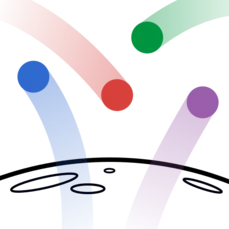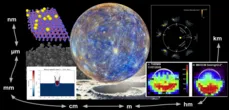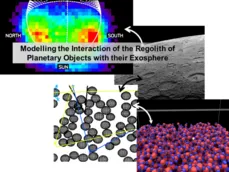Alexander Peschel (Smolka), M.Sc.
Alexander Peschel
Postal address
Lise-Meitner-Str. 9-11
85521 Ottobrunn
- Phone: +49 (89) 289 - 55681
- Room: 9377.02.219
- a.peschel@tum.de
Research Focus and Projects
I investigate the exospheres and their interaction with the surface of airless bodies, primarily the Moon and sometimes Mercury, using in-house models written in Julia, often based on Monte Carlo (MC) and Direct Simulation Monte Carlo (DSMC) methods. My research follows how volatile species, primarily hydrogen and water, migrate across and interact with the planetary surface.

ExESS (Extraterrestrial Exospheres and Surfaces Simulations) is the project title under which numerical models and simulations are created to analyze exospheres and surface of extraterrestrial bodies in our solar system. While several models of the exospheres and surfaces individually exist, their interaction with one another is the focus of ExESS.
While not all of the bodies in our solar system can be modeled this way, those with a collisionless atmosphere, also called a surface-bounded exosphere, can be. Several targets like this exist, the most prominent one being Earth's Moon. Others include Mercury and asteroids like Ceres.
The model is written entirely in the high-performance computer language Julia and is continuously updated and extended to cover more targets as well as to include further physical and geochemical mechanisms. The Code is published on GitHub.
Funded by the International Space Science Institute, the MUSEC group (Multi-Scale Understanding of Surface-Exosphere Connections) is updating the boundary conditions for exosphere models of airless bodies by linking atomistic molecular-dynamics simulations with granular regolith simulations and global exosphere models. This approach describes gas trapping, diffusion and release in the uppermost centimetres of lunar and Mercurian regolith more precisely, making future measurements easier to interpret and offering new insights into the composition and evolution of their exospheres.
Funding:
ISSI - International Space Science Institute (2025 - 2027)
https://teams.issibern.ch/musec/
The IDESI group (Improving the Description of Exosphere Surface Interaction), sponsored bei the International Space Science Institute, is investigating thin atmospheres in our solar system, as well as their interaction with the underlying surface and vice-versa.
Funding:
ISSI - International Space Science Institute (2023 - 2025)
https://teams.issibern.ch/exospheresurfaceinterface/
Teaching & Student Theses
As a teaching assistant I am involved in the master module Space Exploration (lectures, exercises, organization) during the summer term, and leading the practical course Spacecraft Thermal Analysis and Test during the winter term. Please feel free to reach out any time, should you have questions regarding any of these courses. If you are interested in my research topics and you are currently looking for a student thesis, take a look at the list of currently offered theses or simply send me an e-mail at thesis.lpe(at)ed.tum.de.
The following, successful student theses present a selection of topics which I am supervising:
- Breternitz, Jakob: Effects of Surface Slopes on the Lunar Exosphere: Insights from Topographical Data and Statistical Modeling. Bachelor Thesis. 2025.
- Gomez de Olea Ballester, Carlos. Photolysis of Lunar Water in the Exosphere and on the Surface. Research Internship. 2025.
- Reguero, Carlos: Studying Topography’s Interaction with the Lunar Exosphere Developing a Reverse Monte Carlo Method for Particle Tracking in Lunar Exosphere Simulations. Master Thesis, 2025.
Peschel, A., Grava, C., Breternitz, J., and Reiss, P. “Probabilistic Modelling of Lunar Topography for Improved Exosphere Simulations.” Europlanet Science Congress and Division of Planetary Sciences Joint Meeting (EPSC-DPS2025). Helsinki, Finland. 2025. 10.5194/epsc-dps2025-451
Trepat Amorós, M., Brecher, J. N., Peschel, A. and Reiss, P. “3D Scanning and Modelling of Regolith Simulant to Characterise Surface Structures and Micro-Shadowing.” European Lunar Symposium (ELS). Münster, Germany. 2025. 10.5281/zenodo.15480155
Gscheidle, C., Witzel, T., Smolka, A., and Reiss, P. “Permittivity Sensor Development for Lunar and Planetary Surface Exploration,” Frontiers in Space Technologies, 4. 2024. 10.3389/frspt.2023.1303180.
Smolka, A., Simćić, J., and Reiss, P., “Modelling and Experimental Insights into Solar Wind Proton Interaction with Lunar Regolith.” European Lunar Symposium (ELS). Dumfries and Galloway, Scotland, United Kingdom. 2024.
Smolka, A., Saenz Reguero, C., and Reiss, P. “A Reverse Monte Carlo Method to Investigate the Topography Interaction with the Lunar Exosphere.” Europlanet Science Congress (EPSC). Berlin, Germany. 2024. 10.5194/epsc2024-299.
Smolka, A. “Influence of local and global lunar topography on the lunar exosphere.” 2nd Lunar Plasma Interdisciplinary Network (LuPIN-2). Storforsen, Sweden. 2024.
Smolka, A., Nikolić, D., Gscheidle C., and Reiss P. “Coupled H, H2, OH, and H2O Lunar Exosphere Simulation Framework and Impacts of Conversion Reactions,” Icarus, 397. 2023. 10.1016/j.icarus.2023.115508.
Smolka, A. and Reiss, P. “Modelling the Lunar Water Cycle through Coupled Monte Carlo Simulationof the Moon’s Surface and Exosphere.” 54th Lunar and Planetary Science Conference (LPSC). #2089. The Woodlands, TX, US. 2023. [PDF]
Smolka, A. “Lunar Exosphere Simulation: Modeling and Simulation of Our Moon’s Surface-Bounded Exosphere,” Master Thesis. Chair of Astronautics. Munich, 2022. [PDF]
Smolka, A. and Reiss, P. “Multi-Element Lunar Exosphere Simulation to Improve the Prediction of Ballistic Migration of Water.” Lunar Surface Science Workshop 17: Defining a Coordinated Lunar Resource Evaluation Campaign. Online. #5003. 2022. [PDF] [Poster]
Smolka, A., Gscheidle, C., and Biswas, J. “Investigation of Transient Volatile Migration in Lunar Regolith for the Lunar Volatile Scout.” Workshop on Terrestrial Analogs for Planetary Exploration. #8037. Houston, TX, US. 2021. [PDF] [Poster]
Smolka, A., Gscheidle, C., and Biswas, J. “Investigation of Transient Volatile Migration in Lunar Regolith for the Lunar Volatile Scout.” 52nd Lunar and Planetary Science Conference (LPSC). #2283. Houston, TX, US. 2021. [PDF]

